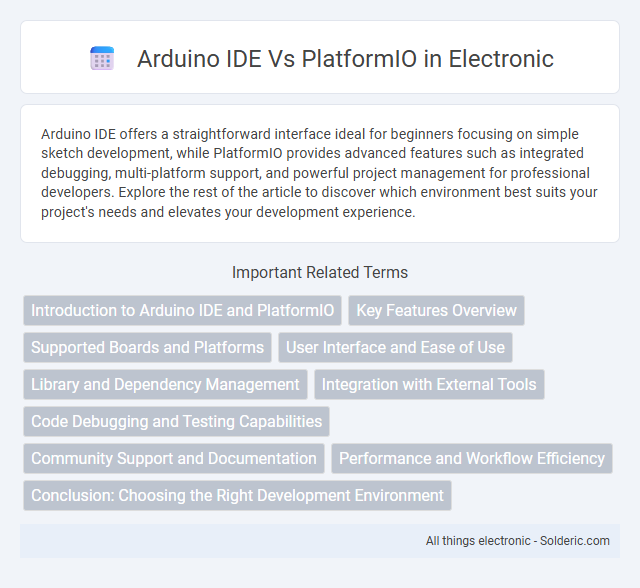Arduino IDE offers a straightforward interface ideal for beginners focusing on simple sketch development, while PlatformIO provides advanced features such as integrated debugging, multi-platform support, and powerful project management for professional developers. Explore the rest of the article to discover which environment best suits your project's needs and elevates your development experience.
Comparison Table
| Feature | Arduino IDE | PlatformIO |
|---|---|---|
| Supported Boards | Official Arduino Boards, Limited 3rd Party | Wide Range including Arduino, ESP, STM32, and More |
| Development Environment | Simple, Lightweight Editor | Advanced IDE with Code Autocompletion & Debugging |
| Build System | Basic Build Process | Powerful Build System with Multi-Project Support |
| Library Management | Manual Installation via Library Manager | Integrated Dependency and Library Management |
| Debugging | Limited or No Debugging Tools | Integrated Debugging with Breakpoints |
| Platform Support | Windows, macOS, Linux | Windows, macOS, Linux, Cloud IDEs |
| Extensibility | Limited Plugins | Extensive Plugin and Extension Ecosystem |
| Open Source | Yes (Arduino IDE) | Yes (PlatformIO Core) |
| Use Case | Beginner-Friendly, Quick Prototyping | Professional Development, Advanced Projects |
Introduction to Arduino IDE and PlatformIO
Arduino IDE provides a straightforward, beginner-friendly environment for writing, compiling, and uploading code to Arduino boards, featuring a simple interface and extensive library support tailored to microcontroller projects. PlatformIO offers a more advanced, multi-platform ecosystem integrated with popular code editors like Visual Studio Code, supporting numerous development boards, debugging, and version control features. Your choice depends on whether you prioritize ease of use with Arduino IDE or the powerful extensibility and professional-grade tools found in PlatformIO.
Key Features Overview
Arduino IDE offers a simple, beginner-friendly interface with basic code editing, serial monitor, and a straightforward one-click upload process to Arduino boards. PlatformIO provides advanced features such as multi-platform support, integrated debugging, unit testing, and a powerful library manager, making it ideal for professional embedded development. Both environments support extensive hardware compatibility, but PlatformIO excels in scalability and integration with popular code editors like Visual Studio Code.
Supported Boards and Platforms
Arduino IDE natively supports a wide range of popular boards such as Arduino Uno, Mega, and Nano, along with official Arduino shields, focusing primarily on AVR and ARM-based microcontrollers. PlatformIO extends support beyond Arduino boards to include diverse platforms like ESP32, STM32, PIC, and many others, integrating over 800 development boards and 35+ frameworks in a single environment. The extensive board compatibility and multi-platform support in PlatformIO make it ideal for complex, cross-platform projects, while Arduino IDE suits straightforward, Arduino-specific development.
User Interface and Ease of Use
Arduino IDE offers a simple, minimalist user interface designed for quick project setup and straightforward code editing, making it ideal for beginners and hobbyists. PlatformIO provides a more advanced and feature-rich environment integrated within popular code editors like VS Code, offering extensive project management, debugging tools, and library management suited for professional developers. The ease of use in Arduino IDE contrasts with PlatformIO's complexity, where users benefit from powerful tools but face a steeper learning curve.
Library and Dependency Management
PlatformIO offers advanced library and dependency management features, automatically resolving and updating dependencies from multiple sources for a seamless development experience. Arduino IDE relies on a simpler library manager, requiring manual updates and limited support for dependency resolution between libraries. Developers working on complex projects benefit from PlatformIO's integrated management system that supports version control and compatibility checks, enhancing reliability and productivity.
Integration with External Tools
PlatformIO offers superior integration with external tools, supporting a wide range of debugging and testing frameworks, version control systems like Git, and Continuous Integration (CI) services, making it ideal for complex, collaborative projects. The Arduino IDE provides basic integration mainly through additional plugins and manual configuration but lacks extensive built-in support for automated workflows and advanced debugging. PlatformIO's compatibility with Visual Studio Code enhances productivity by embedding external tools seamlessly within the development environment.
Code Debugging and Testing Capabilities
Arduino IDE offers limited debugging features, primarily relying on serial print statements for troubleshooting, which can be inadequate for complex projects. PlatformIO provides advanced debugging tools, including integration with hardware debuggers and breakpoint support, enabling more efficient identification and resolution of coding errors. Its comprehensive testing capabilities, such as unit testing frameworks and continuous integration compatibility, further enhance code reliability and development workflow.
Community Support and Documentation
Arduino IDE boasts a large, well-established community with extensive forums, tutorials, and official documentation that simplify troubleshooting and project development. PlatformIO offers a rapidly growing, developer-focused community with comprehensive, modern documentation and integration guides tailored for professional embedded system projects. Both platforms provide rich resources, but Arduino IDE excels in beginner-friendly support while PlatformIO strongly supports advanced users with detailed technical content.
Performance and Workflow Efficiency
PlatformIO offers enhanced performance and workflow efficiency compared to Arduino IDE by supporting parallel compilation and automatic dependency management, which significantly reduces build times. Its advanced debugging tools, integrated library manager, and multi-environment project support streamline development, enabling faster iterations and more robust code maintenance. Arduino IDE, while simpler and beginner-friendly, lacks these advanced features, making it less efficient for complex projects or professional workflows.
Conclusion: Choosing the Right Development Environment
Choosing the right development environment depends on your project complexity and workflow preferences. Arduino IDE offers simplicity and quick prototyping ideal for beginners and straightforward projects, while PlatformIO provides advanced features like integrated debugging, multiple board support, and extensive library management suited for professional development. Your decision should balance ease of use against the need for scalability and customization in embedded programming.
Arduino IDE vs PlatformIO Infographic

 solderic.com
solderic.com